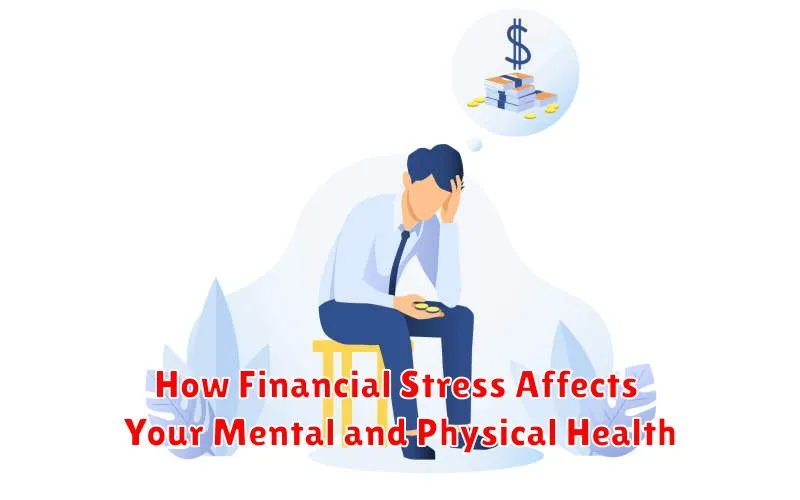Financial stress is a common experience. Whether you’re dealing with debt, job insecurity, or simply the rising cost of living, worrying about money can take a toll on your mental and physical health. In fact, studies have shown that financial stress can lead to a range of health problems, including anxiety, depression, heart disease, and even stroke.
This article will delve into the multifaceted ways that financial stress can impact your well-being, exploring the connections between your financial worries and your sleep, relationships, and overall health. But it’s not all doom and gloom! This article will also provide you with practical strategies and coping mechanisms to effectively manage financial stress and regain control of your financial health.
How Financial Stress Affects Your Mental and Physical Health

Financial stress can significantly impact both your mental and physical well-being. The constant worry about money, bills, and debt can take a toll on your mental health, leading to increased anxiety, depression, and difficulty sleeping. You might experience irritability, anger, and find it hard to concentrate on daily tasks.
The impact of financial stress doesn’t stop there. It can manifest physically as well. You might experience headaches, muscle tension, and fatigue. The stress hormones released by your body can also disrupt your digestive system, leading to stomachaches or other digestive issues. In the long term, chronic financial stress can weaken your immune system, making you more susceptible to illness.
Common Causes of Financial Stress
Financial stress can stem from a variety of sources, often interlinked and compounding one another. Understanding the root causes is the first step to tackling the issue and mitigating its impact on your wellbeing. Let’s delve into some of the most prevalent culprits:
Low Income: One of the most significant contributors is living with a low income. The struggle to afford basic necessities like housing, food, and healthcare can create immense pressure and anxiety.
Debt: Whether it’s credit card debt, student loans, or personal loans, high levels of debt can quickly spiral and become a major stressor. The burden of repayment and mounting interest can feel overwhelming.
Unexpected Expenses: Life throws curveballs. A sudden job loss, medical emergency, or urgent home repair can derail even the most carefully planned budget, leading to financial strain.
Poor Financial Management: A lack of financial literacy, impulsive spending habits, and failing to budget effectively can create a precarious financial situation, contributing to stress and anxiety about money.
Materialism and Societal Pressures: The constant bombardment of advertising and the desire to keep up with societal expectations of material possessions can lead to overspending and a perpetual cycle of financial dissatisfaction.
Relationship Conflicts: Disagreements about finances are a common source of tension in relationships. Differing financial goals, spending habits, and communication styles can all contribute to stress within a partnership.
It’s crucial to remember that these are just some of the common causes, and the specific triggers for financial stress are unique to each individual’s circumstances and experiences.
How to Recognize the Signs of Financial Stress
Financial stress can manifest in various ways, often sneaking up on us before we realize its grip. Recognizing the signs early on is crucial for taking proactive steps to regain control.
One of the first red flags might be behavioral changes. You may find yourself withdrawing from social activities you once enjoyed, fearing judgment or the inability to keep up financially. Sleep disturbances are another common sign, as worries about money plague your thoughts and keep you awake at night. This can further lead to irritability, anxiety, and difficulty concentrating, impacting your work, relationships, and overall well-being.
Physically, financial stress can manifest as headaches, muscle tension, or digestive issues. You might experience changes in appetite, either eating more or less than usual. It’s important to pay attention to these physical symptoms and consider whether they coincide with periods of heightened financial worry.
Recognizing the signs of financial stress within yourself is the first step towards managing it effectively and preventing its escalation. If you resonate with any of these signs, know that you’re not alone and there are resources available to help you navigate this challenging time.
Practical Tips for Reducing Financial Stress

Financial stress can feel overwhelming, but taking proactive steps to manage your finances can significantly reduce anxiety. Here are some practical tips to help you regain control and find peace of mind:
1. Create a Budget: Understanding where your money is going is crucial. Track your income and expenses to identify areas where you can cut back and save.
2. Build an Emergency Fund: Having 3-6 months’ worth of living expenses saved can act as a financial cushion, reducing stress related to unexpected events like job loss or medical bills.
3. Prioritize Debt Repayment: High-interest debts can be a major source of stress. Explore strategies like the debt snowball or avalanche method to pay down debts strategically.
4. Negotiate Bills and Expenses: Don’t hesitate to negotiate lower rates for services like internet, cable, or insurance. You might be surprised at how much you can save.
5. Seek Financial Guidance: A financial advisor can provide personalized advice on budgeting, investing, and debt management, helping you make informed decisions.
6. Set Realistic Financial Goals: Start with small, achievable goals that give you a sense of progress and motivation to keep going.
7. Explore Additional Income Streams: Consider a side hustle or freelance work to supplement your income and accelerate your financial goals.
8. Practice Mindfulness and Self-Care: Remember to take care of your mental well-being. Engage in activities that help you relax and reduce stress, such as exercise, meditation, or spending time in nature.
The Role of Budgeting in Managing Financial Stress
Financial stress often stems from a lack of control over one’s finances. Budgeting provides that much-needed control by offering a clear picture of income, expenses, and spending habits.
When you create a budget, you gain a realistic understanding of where your money is going. This awareness can be empowering, allowing you to identify areas where you can cut back on unnecessary spending and redirect those funds towards financial goals or building an emergency fund.
The simple act of tracking your spending and sticking to a budget can significantly reduce financial anxiety. It provides a sense of structure and predictability, replacing feelings of uncertainty with a sense of being in command of your financial well-being.
How to Seek Help When Financial Stress Becomes Overwhelming
Feeling overwhelmed by financial stress is more common than you might think. You’re not alone, and there’s no shame in seeking help. In fact, reaching out for support is a sign of strength, showing your commitment to regaining control over your financial well-being and, consequently, your overall health.
Start by having an open and honest conversation with someone you trust, like a family member or close friend. Sharing your worries can lighten the burden and provide emotional support. Next, consider reaching out to a financial advisor. These professionals can help you create a budget, explore debt management options, and develop a plan to achieve your financial goals.
Don’t hesitate to seek guidance from credit counseling agencies. These non-profit organizations offer free or low-cost services, including budgeting assistance, debt management plans, and educational workshops. Remember, taking that first step towards seeking help is often the hardest, but it’s a crucial step towards regaining your financial footing and reducing the negative impact of stress on your health.
The Long-Term Effects of Financial Stress on Your Well-Being
Experiencing financial stress over a prolonged period can have a profound impact on both your physical and mental well-being. The constant worry and anxiety associated with financial instability can manifest in various ways, potentially leading to serious health concerns if left unaddressed.
Chronic stress, often triggered by long-term financial pressure, can disrupt the body’s natural equilibrium. It can weaken the immune system, making you more susceptible to illnesses. Furthermore, it can contribute to cardiovascular problems like high blood pressure and heart disease. The ongoing strain can also disrupt sleep patterns, leading to insomnia and other sleep disorders. This lack of quality rest further exacerbates stress levels, creating a vicious cycle impacting overall health.
On a mental and emotional level, the long-term effects of financial stress can be equally damaging. The persistent feeling of insecurity can lead to anxiety disorders, depression, and even substance abuse as individuals seek unhealthy coping mechanisms. Relationships can suffer as stress levels rise, leading to increased conflict and isolation. This can further compound feelings of hopelessness and despair, making it even more challenging to break free from the cycle of financial stress and its detrimental effects.

